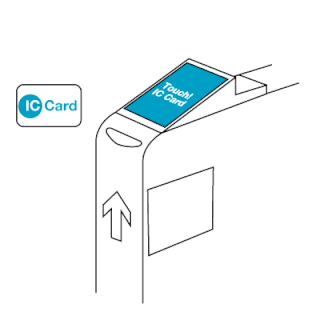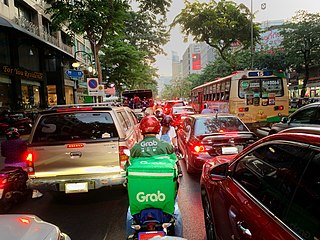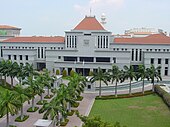
The Mass Rapid Transit system, referred to in common parlance as the MRT, is a rapid transit system that constitutes the bulk of the railway network in Singapore, spanning the length and breadth of the city-state's main island. Following two decades of planning and deliberation, the system commenced operations in November 1987 with 5 stations spread over 6 kilometres (3.7 mi) of track. The network has since grown swiftly in accordance with Singapore's aim of developing a comprehensive rail network as the backbone of the country's public transportation system, averaging a daily ridership of 3.384 million in 2019, representing an annual ridership of over a billion passengers.

The North East MRT line (NEL) is a high-capacity Mass Rapid Transit (MRT) line in Singapore. Operated by SBS Transit, it is the shortest MRT line at only 20 kilometres (12 mi). The line runs from HarbourFront station in southern Singapore to Punggol station in the northeast, serving 16 stations via Chinatown, Little India, Serangoon and Hougang. Coloured purple on official maps, it is the country's and world's first fully automated underground rail line.

SBS Transit Ltd (SBST) is a multi-modal public transport operator in Singapore operating bus, rail and taxi services. With a majority of its shares owned by ComfortDelGro Corporation at 75%, it was formerly known as Singapore Bus Services before rebranding to SBS Transit on 1 November 2001. It is the largest public bus operator in Singapore.

The Land Transport Authority is a statutory board under the Ministry of Transport of Government of Singapore. It is located at Hampshire Road near Little India MRT station.

The East West line (EWL) is a high-capacity Mass Rapid Transit (MRT) line operated by SMRT, running from Pasir Ris station in the east to Tuas Link station in the west, with an additional branch between Changi Airport and Tanah Merah stations. It is the second Mass Rapid Transit line to be built in Singapore. The 57.2 kilometres (35.5 mi) line is currently the longest on the MRT network, with 35 stations, 8 of which are underground. The line is coloured green on the rail map.

The EZ-Link card is a rechargeable contactless smart card and electronic money system that is primarily used as a payment method for public transport such as bus and rail lines in Singapore. A standard EZ-Link card is a credit-card-sized stored-value contact-less smart-card that comes in a variety of colours, as well as limited edition designs. It is sold by TransitLink Pte Ltd, a subsidiary of the Land Transport Authority (LTA), and can be used on travel modes across Singapore, including the Mass Rapid Transit (MRT), the Light Rapid Transit (LRT), public buses which are operated by SBS Transit, SMRT Buses, Tower Transit Singapore and Go-Ahead Singapore, as well as the Sentosa Express.

Changi Airport MRT station is an underground Mass Rapid Transit (MRT) station on the Changi Airport branch of the East West line located within Singapore Changi Airport in Changi, Singapore. The station is operated by SMRT Trains and is built in an east-west direction with the two ends of the station connecting directly to Changi Airport Terminals 2 and 3. It is the eastern terminus of the branch and is currently the easternmost MRT station in Singapore.

Kranji MRT station is an elevated Mass Rapid Transit (MRT) station on the North South line (NSL). Situated in Sungei Kadut, Singapore along Woodlands Road, it serves the Singapore Turf Club and the Woodlands Wafer Fabrication Park. The station is operated by SMRT Trains.

Telok Ayer MRT station is an underground Mass Rapid Transit (MRT) station on the Downtown line (DTL). Situated in Outram, Singapore, the station serves various offices and commercial developments around the junction of Cross Street and Telok Ayer Street. The station is operated by SBS Transit.
Taxis and private hire cars are popular forms of public transport in the compact sovereign city-state of Singapore, with fares considered relatively low compared to those in most cities in developed countries.
The Cabcharge account payment system was established in 1976 to provide taxi passengers a way to pay for taxi fares by non-cash means. The payment system is owned and operated by A2B Australia, an Australian Securities Exchange listed public company. In the UK and Singapore, Cabcharge is operated by subsidiaries of ComfortDelGro.

Taxis in Australia are highly regulated by each Australian state and territory, with each state and territory having its own history and structure. In December 2014, there were 21,344 taxis in Australia. Taxis in Australia are required to be licensed and are typically required to operate and charge on a fitted taximeter. Taxi fare rates are set by State or Territory governments. A vehicle without a meter is generally not considered to be a taxi, and may be described, for example, as a hire car, limousine, carpool, etc. Most taxis today are fuelled by liquid petroleum gas. A2B Australia owns and operates the Cabcharge payment system, which covers 98% of taxis in Australia, and operates one of Australia's largest taxi networks.

Rochor MRT station is an underground Mass Rapid Transit (MRT) station on the Downtown Line (DTL) in Rochor, Singapore. Located between Sungei Road and Rochor Canal Road, the station serves landmarks such as Sim Lim Square, The Verge, the LASALLE College of the Arts and Tekka Centre. The station is operated by SBS Transit.

The Taxi Industry Inquiry or the Fels Inquiry was an inquiry commissioned in 2011 into the taxi industry and taxi services in the State of Victoria, Australia, by the Taxi Services Commission. The Inquiry was headed by Professor Allan Fels, the former head of the Australian Competition and Consumer Commission, assisted by Dr David Cousins.
The following lists events that happened during 2013 in the Republic of Singapore.
Many communities, governments, and organizations have established rules and regulations that specifically govern ridesharing companies. In some jurisdictions, for-profit ridesharing operations are completely illegal. Regulations can include requirements for driver background checks, fares, the number of drivers, and licensing.

Grab Holdings Inc., commonly known as Grab, is a Singaporean multinational company headquartered in Singapore. In addition to transportation, the company offers food delivery and digital payments services via a mobile app. Starting in 2012 as the MyTeksi app based in Kuala Lumpur, Malaysia, it expanded the next year as GrabTaxi. It has since expanded into other services, following the "super app" model. In 2014, it moved its headquarters to Singapore and renamed itself to just Grab.

A2B Australia is an Australian public company which was listed on the Australian Securities Exchange in December 1999 and is an ASX 200 company. The company was founded by Reg Kermode. In 1976, the company established Cabcharge, an account payment system to provide a way to pay for taxi fares by non-cash means, which today is the sole provider of the in-taxi service.
The following lists events that happened during 2018 in the Republic of Singapore.
FREE NOW is a mobility as a service provider headquartered in Hamburg, Germany. FREE NOW was formed in February 2019 from a joint venture between BMW and Daimler Mobility. Marc Berg is CEO of the FREE NOW Group.















